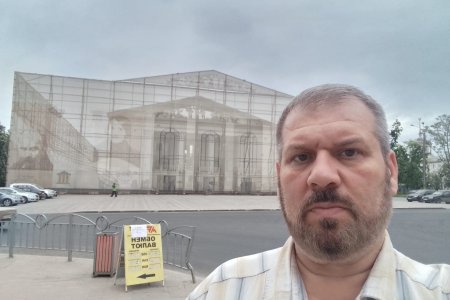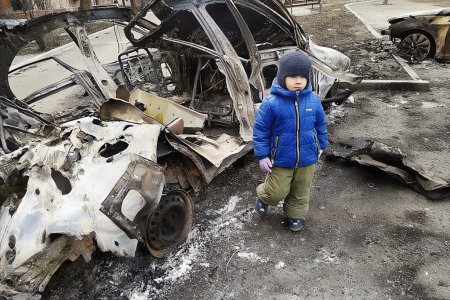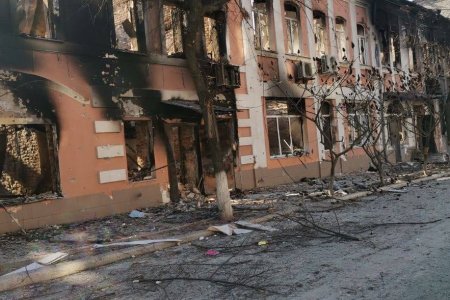The war as could be seen and heard from the window
In the last eight years, war has always been nearby. It could be seen and heard from the windows of high-rise buildings in the eastern regions. It thundered in Shyrokyne, and this happened every day. Things started to heat up in the last couple of weeks before the full-scale invasion. Of course, I didn’t believe it: I thought that nothing would happen, everything would be fine.
On 24 February, there were strange feelings. It seemed that everything should start from Mariupol, but in Mariupol, that day, it was relatively quiet. Explosions in Rivne and Lviv. But how was this possible? It’s so far away! All this should have been here, not there. We soon realized that this was our new reality.
The first hits in our area occurred on February 25-26. These were single shots. But gradually, it became hotter, and shells were flying very close. We soon learned that heavy fighting was already happening near the 30th school. It was loud there, and the sounds were getting closer. First, school and then the maternity hospital began to be bombed by aircraft. Around 3 March, it was escalating in the area, and on 16 March, I was wounded.
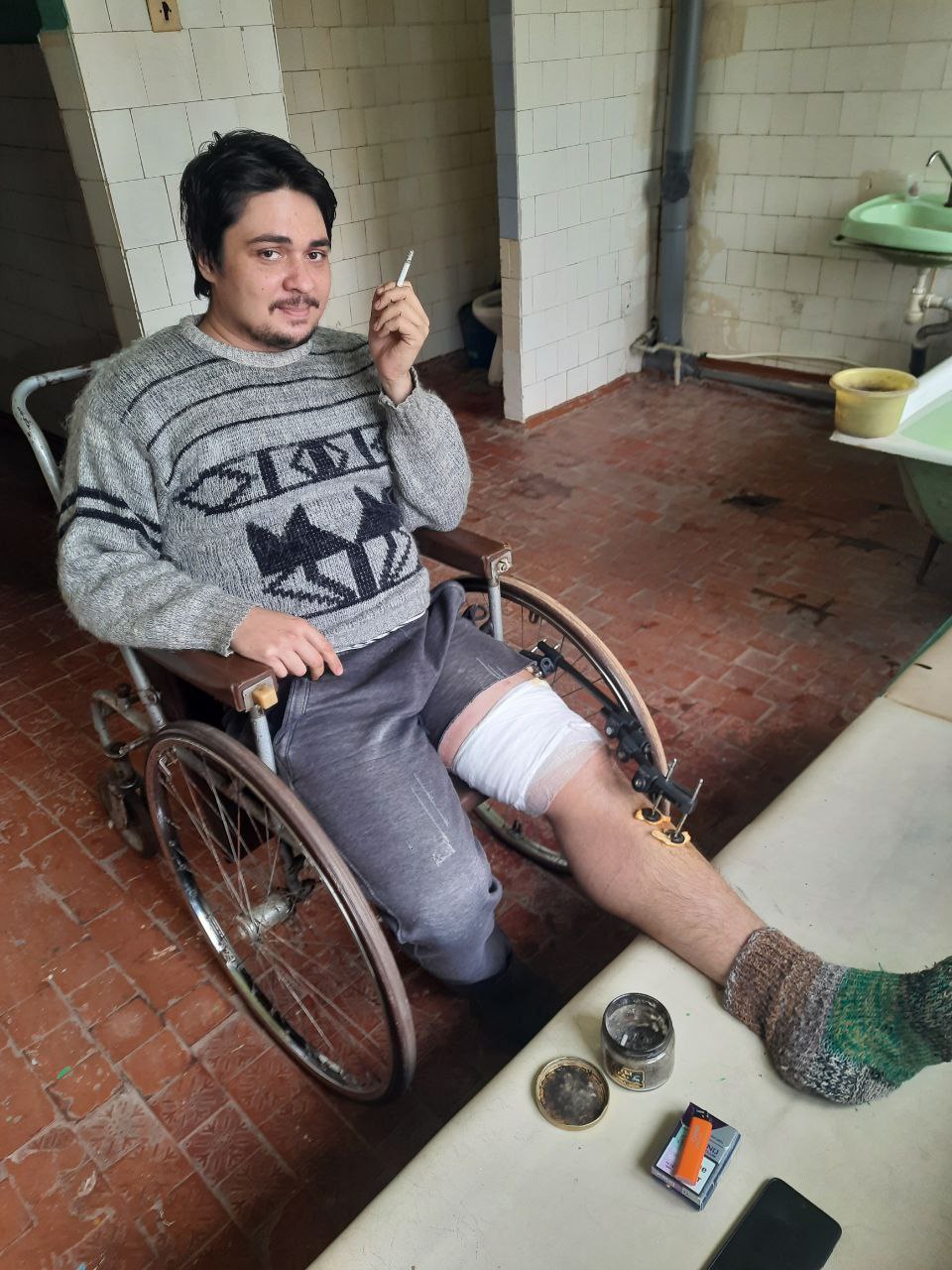
Suddenly, there was a gray veil before my eyes
It was a surprisingly quiet day; there were no bombings in the morning. I looked at my watch and wondered whether to start cooking dinner. I decided that it was still early, and I had to wait. I went to my neighbor, who had already started lighting a fire, sat down next to him, and we talked about things.
Then, as in movies, suddenly, a gray veil was before my eyes. I come to my senses from my screams. I understood that I was screaming, but I couldn’t hear my voice. It felt like a giant log suddenly hit you. I tried running but immediately fell and realized I couldn’t run. Something was wrong with my leg. The shelling continued, but the next shells flew further. I didn’t know what it was; perhaps they missed? Why they decided to shell the yard was unclear. The neighbor ran to hide the family in the basement. With him was his wife, mother, and two children. He ran to the family, and I crawled to hide behind the garage for cover. About five minutes later, the shelling ended.
It was not a very large shell because, as I understand it, it landed about three to five meters away, but we survived. It was already a miracle. I had an open fracture of my left hip, burns, and a damaged ear. We began to decide what to do. The neighbor was also slightly wounded, and his leg was injured by shrapnel. We decided that we would go to the first city hospital.
The neighbor got behind the wheel of his car. They pushed me inside on the carpet and tied a board to my leg to somehow fix it. My mother went with us. It was perhaps the most terrible journey of my life. For the first time, I saw what was happening in the city. I was conscious. I remember shouting: “Give me a smoke, we’ll get there, and everything will be fine.”
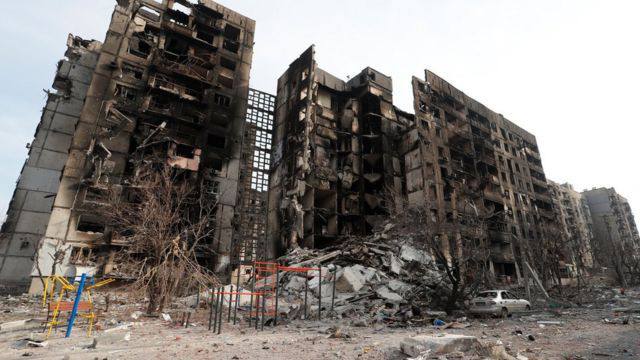
They wrote my first and last name on my forehead
There were a lot of people in the hospital. They somehow pulled me out of the car and got us in. They wrote my first and last name on my forehead so that I could be identified if something happened. The next day, they performed surgery. I was fitted with an external fixation device to cure my leg — many thanks to the doctors for doing this. The conditions were tough. They managed to install this device between shelling, without X-rays, and electricity. However, the anesthesia was not very good: I felt everything during the first half of the operation. But thank you very much for saving my leg. I understand everyone who arrived after me was no longer left with limbs. “Amputation” was the first word that sounded there. People’s injuries were severe.
My mother and I stayed in the hospital, and she took care of me. The situation around us was getting worse, and we realized that the shelling was getting closer to the hospital. The first severe attack occurred on 27 March. It was Theater Day, and for the first time, I heard that the Drama Theater had been bombed. Someone came from the city center and told us about it. That day, an intense barrage of Grad rockets hit the hospital. One guy died, and there were many wounded.
And on 30 March, a terrible shelling of the hospital began — it was demolished. Every five minutes for two to three hours, something heavy flew in. Our building was razed to the ground. This was a targeted destruction of the hospital. Those who could run, ran to the basement, to a shelter. Those who couldn’t — lay there and waited. My mother and I just stayed there because I couldn’t move.
When the shelling ended, we found a wheelchair. The main problem was that I could not bend my leg, which was always straight. But I somehow managed to sit down, and we went to the shelter, clearing debris and glass along the way. The entrance was on the first floor, with stairs leading down. There was no room, and people were already sitting on these stairs. We sat opposite the door; there were a few centimeters from my foot to the entrance. It was illusory security, but there was nothing better. I sat like that for two days, putting a stool under my leg. It was already difficult with water and food. Subsequently, the Russians began to obliterate the hospital. The shrewder people have already come out; my mother and I were the second to last to somehow crawl out of this basement and move to another. It wasn’t easy either. People started saying that we all needed to leave the hospital altogether. They [Russians] attacked the hospital for several days in a row, and it was purposeful.
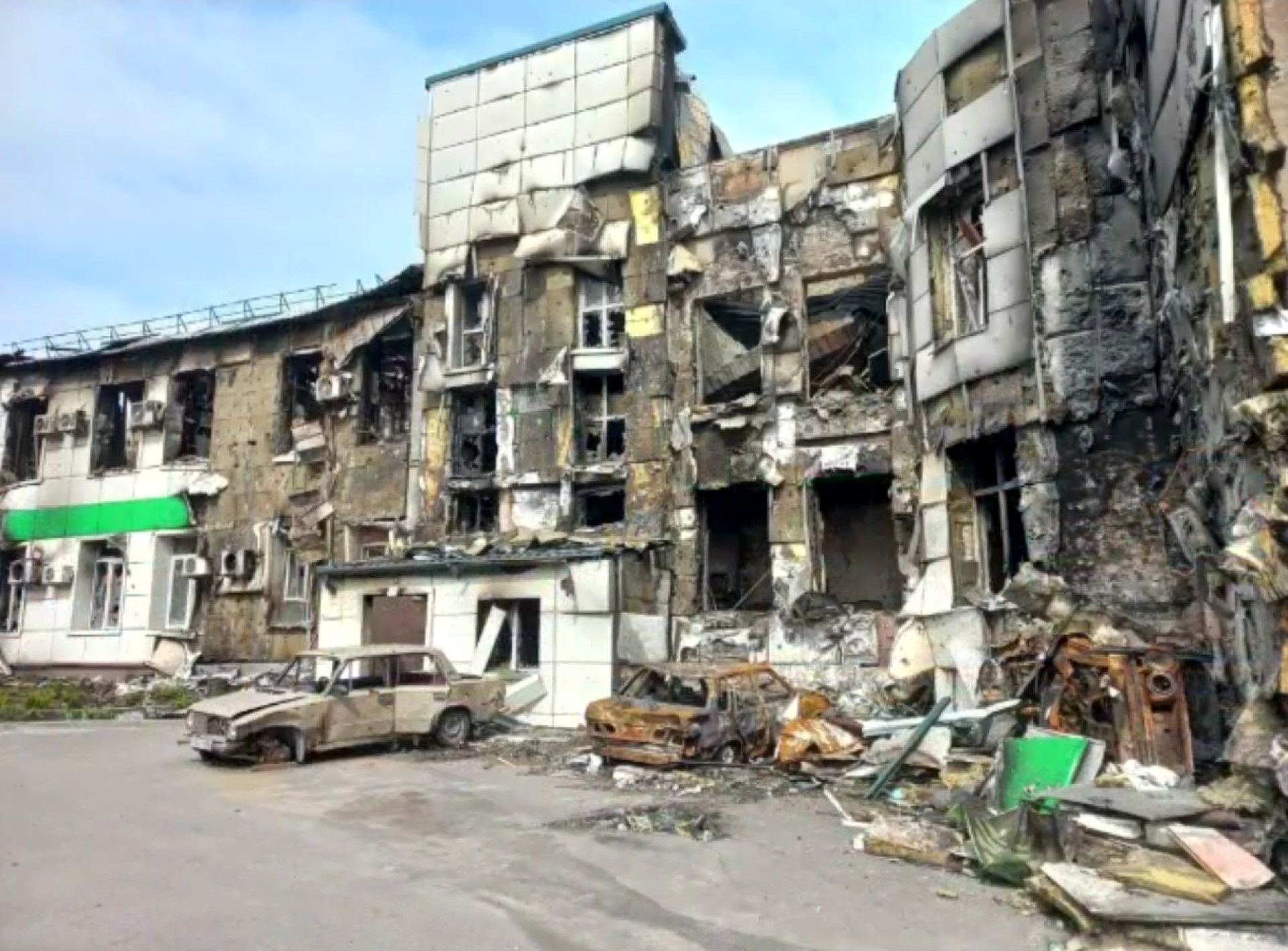
My mom died on the stairs
I spent the night from the second to the third of April sitting on a sizeable insulating roll, with my leg on some chair. In the morning, the first group left the basement. I don’t know what happened to them. My mother and I decided that we would go the next day. People said that “Pentagon” [the popular name for the Mariupol district] had already been bombed out. It was quiet there now, and the Chechens occupied it. We wanted to get home or at least somewhere because staying in the hospital became pointless.
On 4 April, the next group began to gather in the morning; they waited for a lull and left. I told my mom: “Take the cart, we’ll go too.” She started to bustle and ran to pull out the cart. I don’t know what happened after that; no one can determine the reasons. Maybe it’s the heart, or perhaps something else. She became ill, fell, and within an hour, my mother died on the steps of this basement. There was no one to help her. For two hours, we persuaded people to take her body out into the street. There was no longer any talk about burial. She was placed on a gurney and taken outside.
He has a machine gun, and your leg is broken
On the evening of 5 April, a nurse from the hospital came to us and said that the next day, at nine in the morning, there would be an evacuation. There were 14 of us, all with serious injuries. It took a very long time; they were DPR [“Donetsk People’s Republic”] soldiers. They gathered us at the second building. They took me there in a cargo wheelchair. You go, and everything around you is bombed out; a pipe from some kind of shell sticks out half a meter away. There is a bombardment somewhere. But you understand that if they organized this evacuation, at least they wouldn’t shoot.
We were all already in such a state that if the Martians had flown to us and said: “We are taking you to Mars and will carry out experiments,” we would have agreed — anything to not stay here. No coercion was needed. Everyone said: “Take us out of this hell because it’s unbearable.”
The soldiers who took us out were from Donbas. They were firmly convinced that they were saving us. So they said: “We are saving you.” They behaved more or less appropriately because they really believed in it. “We are saving you.” But you can’t say what you think because he has a machine gun, and your leg is broken.
I am currently undergoing treatment in the UK. Perhaps due to the circumstances of the injury and the conditions in which I was given first aid, I suffered many complications. Of course, the doctors did everything possible at that time, but their capabilities were scanty. I had two major operations in Latvia. First, they completely reassembled my leg and installed a metal plate because I had lost a piece of bone. However, nothing has been done to my ear yet, and my left ear has 50% hearing loss. The treatment process continues.
